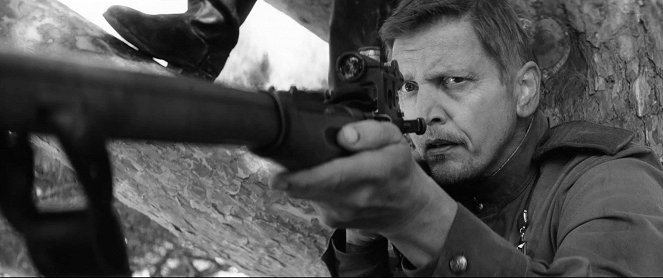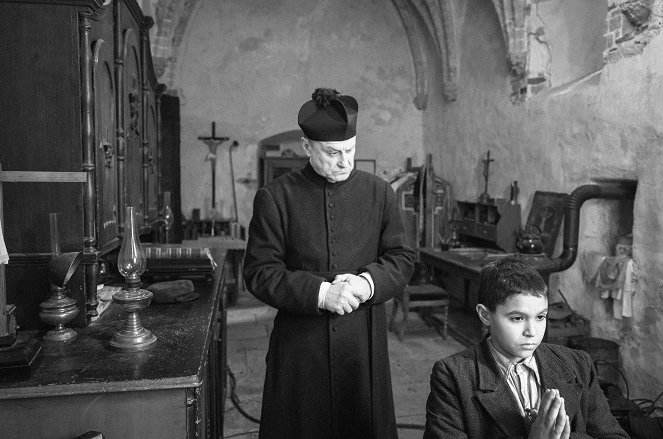Directed by:
Václav MarhoulScreenplay:
Václav MarhoulCinematography:
Vladimír SmutnýCast:
Petr Kotlár, Udo Kier, Michaela Doležalová, Zdeněk Pecha, Lech Dyblik, Jitka Čvančarová, Stellan Skarsgård, Harvey Keitel, Julian Sands (more)Plots(1)
The film follows the journey of a boy, entrusted by his Jewish parents to an elderly foster mother in an effort to escape persecution. Following a tragedy, the boy is on his own. Wandering through the desecrated countryside, the boy encounters villagers and soldiers whose own lives have been brutally altered, and who are intent on revisiting this brutality on the boy. When the war ends, the boy has been changed, forever. (Eureka Entertainment)
(more)Videos (4)
Reviews (11)
The Painted Bird is undoubtedly an ambitious filmmaking project eyeing festival awards, as evidenced by its strong theme and international cast. I welcomed the black-and-white visuals, which (as was once the case with Psycho) reduced the violence and atrocities presented by the absence of colour. I was intrigued by the episodic nature of the film, in which the young and initially innocent child protagonist meets various characters on his 'journey home' who influence, mark or corrupt him in different ways. By Czech standards, this is without question a supremely raw film featuring pervasive violence against humans and animals and an inhospitable landscape full of suffering, hopelessness and sadness. Of the individual episodes, the ones that stick out in my mind the most are those with the shameless Jitka Čvančarová, the transport of the Jews and the raid on the village. Although the film is nearly three hours long, it went by really fast in the cinema. As noted, the film lacks music alongside the colours - unless you counts the church scenes and the subtitles – which is a bit of a shame, as there is little dialogue and the music could have filled in and enhanced these quiet spots.
()
This film is saved by its black-and-white cinematography, framing and lighting, as well as by the depiction of the era with the right set designs and costumes. The narrative structure, however, is completely monotonous, devoid of any dramatic arc, artistic symbolism, more sophisticated editing techniques and internal emotional development, which could have been at least partially provided by (unfortunately completely absent) music. The Painted Bird misses most of what this type of film needs. The characters have well-chosen faces, but they only appear for a few minutes, barely speak and give nothing to the film. Their ugliness just contributes to the premature loss of the boy’s innocence in a nasty environment. And we come to understand that this loss is the point of the whole film only in the last few minutes, after almost three hours of monotonous stacking of the similarly looking and sounding episodes on top of each other.
()
A peasant road-movie, Roma, Volyň, a twisted The Hundred Year-Old Man Who Climbed Out of the Window and Disappeared or Forrest Gump? The Painted Bird has a little of each, but what it certainly isn't is a historical account, let alone a drama. It’s rather a collection of realistically possible events that are unrealistically glued into one story. It wouldn't be a problem if the situations Jožek gets into were varied and each of them would develop his character differently and move the plot somewhere. But, after a successful introduction, we are left with a repetitive parade of unfortunate episodes with elusive creatures, where the variations, as well as the emotions, are few, because with each subsequent cruel episode you paradoxically worry less about the hero. Kosinski's work is simply unrewarding to film, only a genius with a clear vision could squeeze something more coherent out of it. Marhoul merely retells it and the only genius on the set remains Smutný with his camera.
()
I don’t watch Czech films these days, they don’t interest me and I don’t see in them anything original and authorial in terms of style and narration (when I happen to stumble upon them on TV). The Painted Bird is not the revolutionary and morally questionable movie the initial responses made us believe, but it’s nonetheless honest, intimate and thoughtful filmmaking of the kind other domestic productions can not match. There have been comparisons with Tarkovsky or Markéta Lazarová, but I wouldn't go that far; Marhoul is more sober and more naturalistic, and also more accessible from a narrative standpoint. The black and white composition is an understandable and correct step for such bleak material, while the taciturnity combined with the overuse of details and the sparse editing allow for a deeper immersion of the viewer in the atmosphere so they can be ready to react with empathy to all the horrors in front of them, which the camera tastefully hides most of the time, so the story will not feel gratuitously violent. The narration consists of simply intertwined episodes with the unifying motif of the complex development of the protagonist – complex only in the sense that each chapter shapes a different side of Jošek's personality and gives him experiences that help him grow up in that terrible environment without real love. Otherwise, the development is not too surprising, Marhoul relies mainly on changing of moral environments, which take second place to the objective statements of the cruelty of war, the misery associated to it and the religious fanaticism of the predominantly rural civilians. It is a pity that in the episodic structure this secondary function gradually becomes stronger than the repeated suffering of the main character. Overall, however, I must praise it, The Painted Bird looks beautiful, it doesn’t get boring despite its runtime and the repetitiveness, the performances and the casting of the repulsive village folk are perfect (even I could have had a small role), and it presents big ideas and a cruel vision of human nature with a strong author’s signature (though I couldn’t avoid laughing when I heard the Wilhelm Scream when someone fell off a horse). A case of impressive filmmaking that may not have that huge an impact on savvy viewers despite its great ambitions, but that with every shot and scene it screams that it should be taken seriously here and abroad – and that, fortunately, it doesn’t get too annoying even after two hours.
()
After Tobruk, Václav Marhoul convinced me for the second time that he and I are simply not on the same wavelength. Now, after the almost three-hour ‘frantic ride,’ I can’t help but wonder what he wanted to convey with this film. Next to Come and See and Hatred, The Painted Bird feels rather underwhelming. The information that the story takes place during WWII came to me only in the form of a Storch flying over, other indications appeared much later. I still don't know where the story was set (Carpathian Ruthenia?). I also didn't understand why the little Jew was played by a Gipsy. The story unfolded in a very awkward way. Throughout the film I felt like it was weirdly cut, I was annoyed by its strange rhythm: boring, boring, boring - brutal violence - boring, boring, boring - brutal violence - boring, boring, boring – pedophilia - boring, boring, boring - zoophilia, etc. I also didn't understand why there was violence in the film in the first place when the creators were obviously more afraid of it than the viewers. That way, most scenes look silly bordering on ridiculous. For example, the completely pointless zoophilia scene had me in stitches, Václav Marhoul can't have been serious. On the other hand, if Fifty Shades of Grey gives you goosebumps, this will be a rough experience for you, which might even lead to some involuntary bedwetting. At least I already know what those awards were for. Wait... actually, I don't. P.S. Those bikini tan lines on Denisa Pfauserová sure looked historically accurate :-)
()



Ads